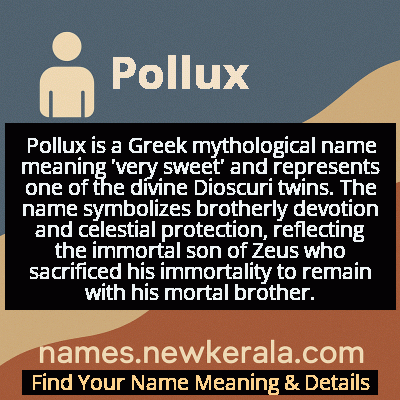Pollux Name Meaning & Details
Origin, Popularity, Numerology Analysis & Name Meaning of Pollux
Discover the origin, meaning, and cultural significance of the name POLLUX. Delve into its historical roots and explore the lasting impact it has had on communities and traditions.
Name
Pollux
Gender
Male
Origin
Greek
Lucky Number
1
Meaning of the Name - Pollux
Pollux is a Greek mythological name meaning 'very sweet' and represents one of the divine Dioscuri twins. The name symbolizes brotherly devotion and celestial protection, reflecting the immortal son of Zeus who sacrificed his immortality to remain with his mortal brother.
Pollux - Complete Numerology Analysis
Your Numerology Number
Based on Pythagorean Numerology System
Ruling Planet
Sun
Positive Nature
Leaders, ambitious, highly driven, self-reliant, innovative.
Negative Traits
Overly aggressive, domineering, impatient, selfish.
Lucky Colours
Red, orange, gold.
Lucky Days
Sunday.
Lucky Stones
Ruby, garnet.
Harmony Numbers
2, 3, 9.
Best Suited Professions
Entrepreneurs, managers, engineers.
What People Like About You
Courage, determination, leadership.
Famous People Named Pollux
Pollux of Alexandria
Ancient Greek Grammarian
Renowned scholar and teacher who authored numerous grammatical works and commentaries on classical Greek literature
Pollux Romanus
Roman Military Commander
Distinguished cavalry officer known for his strategic innovations in border defense during the Roman Empire's later period
Pollux of Naucratis
Greek Sophist and Rhetorician
Author of 'Onomasticon,' an important encyclopedia of Greek words and phrases that became a valuable resource for later scholars
Name Variations & International Equivalents
Click on blue names to explore their detailed meanings. Gray names with will be available soon.
Cultural & Historical Significance
Throughout classical antiquity, the Dioscuri were worshipped as protectors of sailors, appearing as St. Elmo's fire during storms, and as patrons of athletes, particularly in Spartan culture where they embodied ideal warrior companionship. Their cult spread throughout the Mediterranean, with temples in Rome where they were credited with aiding victory in the Battle of Lake Regillus. The enduring legacy of Pollux reflects ancient values of loyalty, the transcendence of death through love, and the celestial ordering of human relationships that continue to resonate in Western cultural consciousness.
Extended Personality Analysis
Individuals named Pollux are often perceived as possessing strong protective instincts and deep loyalty to those they care about, mirroring the mythological Pollux's devotion to his brother. They tend to be courageous and willing to make significant sacrifices for loved ones, displaying a blend of strength and sensitivity that makes them both reliable companions and fierce defenders. Their personality often balances earthly practicality with higher ideals, reflecting their mythological counterpart's dual nature as both mortal and divine.
Pollux-named individuals typically exhibit resilience in adversity and a natural inclination toward leadership, though they often prefer partnership and collaboration over solitary achievement. They're frequently described as having a magnetic presence that draws others to them, combined with a steadfast nature that provides stability in relationships. This combination of traits makes them excellent team players who can both inspire and protect, while their mythological heritage suggests an ability to bridge different worlds or perspectives—whether cultural, intellectual, or social—making them effective mediators and connectors.
Modern Usage & Popularity
In contemporary times, Pollux remains a rare but distinctive choice, primarily used by parents seeking a name with classical roots and mythological significance. Its usage peaked modestly in the early 20th century during neoclassical revivals but has seen a slight resurgence in recent decades as unique mythological names gain popularity among educated, literary-minded families. The name maintains a steady presence in academic and artistic circles, often chosen for its strong historical connections and distinctive sound, though it rarely appears on mainstream popularity charts. Modern usage tends to emphasize the name's celestial connections and brotherly symbolism, making it appealing to parents valuing both tradition and individuality in naming choices.
Symbolic & Spiritual Meanings
Symbolically, Pollux represents the enduring power of fraternal love and the transcendence of mortal limitations through devotion. As one of the Gemini twins, he embodies the concept of complementary duality—the balance between mortal and immortal, earthly and celestial, practical and idealistic. The name carries strong connotations of protection and guidance, derived from his mythological role as a patron of sailors and travelers, while also symbolizing the ultimate sacrifice for loved ones and the idea that true bonds can overcome even death itself. In broader metaphorical terms, Pollux represents the human capacity for loyalty that transcends self-interest and serves as a bridge between the mundane world and higher realms of existence, with his celestial aspect linking him to navigation through both literal and life's metaphorical challenges.

